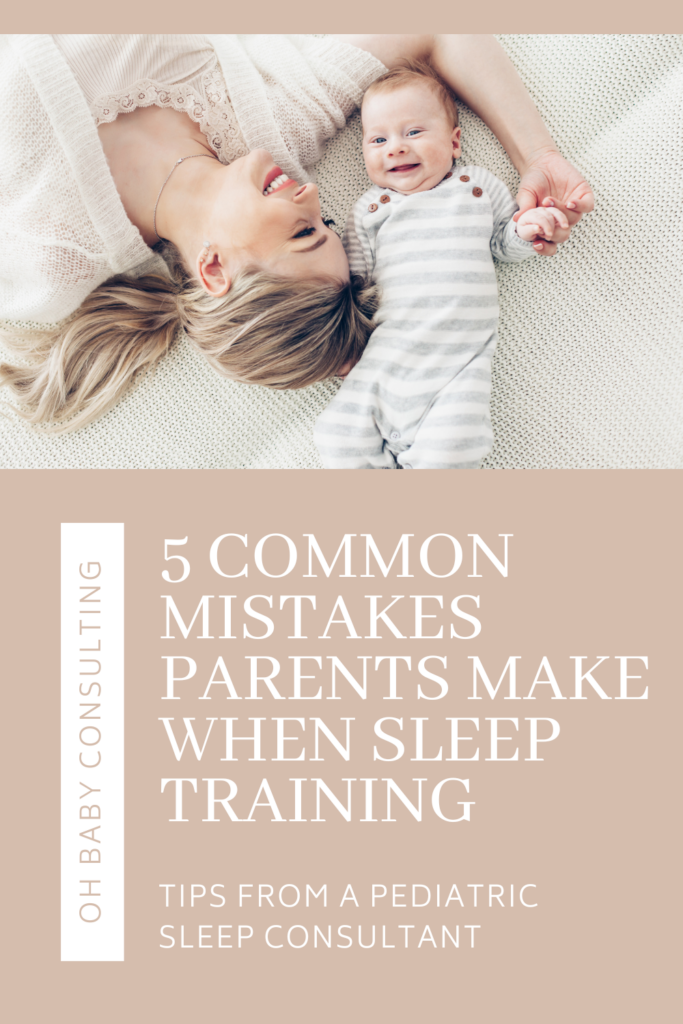If you’re thinking about sleep training, you’ll want to make sure you have a plan in place for how to approach the process in order to see success.
As you prepare to get started, make sure to also avoid these five sleep training mistakes:
1. Starting too early
Formal sleep training during the newborn period is not appropriate. Not only are newborns’ circadian rhythms still developing, their sleep organization is still immature and erratic. This can make the task of sleep training both insurmountable and unattainable.
Additionally, most newborns need to be up multiple times to eat overnight because their tummies are very small.
Depending on the health & growth of your child, you may consider sleep training as an option between 12-16 weeks (but please check with your doctor if you are unsure).
However, just because you aren’t going to be formally sleep training your newborn doesn’t mean you can’t be proactive with a healthy independent sleep foundation. Newborn coaching can help you avoid formal sleep training altogether and make independent sleep a priority in an age-appropriate way right from the start.
2. Misunderstanding of methods
My plans offer many levels of choice depending upon a parent’s comfort level and a child’s developmental stage. However, often times parents who choose a generic method are unclear about the parameters and how exactly to implement it properly. This can lead to inconsistency, confusion, crying, and ultimately a lack of progress.
When preparing for sleep training, make sure that you know exactly…
- How to lay your child down in their crib awake
- What to do if they cry
- How long to allow crying
- When to intervene at bedtime
- How to intervene at bedtime
- How to handle nighttime wake ups
- How to address nighttime feeds (maintain, wean down, drop?)
- How to handle early morning wake ups
- How to handle naps
- What to do if nap is refused
- What to do if nap is short
…and the list goes on!
If the method you are using does not spell out exactly how to handle all of these scenarios, I’d recommend looking for an alternative plan.
The plans you’ll find inside Oh Baby Sleep Course or the personalized one I create for you if we work together one-on-one is going to include all of the above components (+ more) so that you feel 100% confident going into sleep training. This consistency and lack of confusion also serves to reduce crying & allows the process to work more quickly.
3. Lack of consistency
Once you have a plan, you need to execute it with consistency. Consistency is at the heart of being successful when sleep training because if things change from moment to moment, it’s going to be difficult for your child to learn what is expected of them.
It can be enormously helpful to surround yourself with supportive cheerleaders who can help keep you accountable. This is also another added benefit of one-on-one sleep coaching – a built in support person who is not only well-versed in baby sleep, but who is also your #1 fan and advocate on your sleep journey.
4. Inappropriate schedule
There are many puzzle pieces that you want to be mindful of when making sleep changes, and having an age-appropriate schedule is one of the more important ones. While any child can be taught to sleep independently, there will continue to be tears and stress if they are not on the correct schedule. Not building up enough sleep debt can cause bedtime battles and protests while overtiredness can cause meltdowns and fragmented nights. Understanding the specific sleep needs of your child is critical to seeing success.
5. Nap training first
I am an advocate of tackling night training and nap training at the same time, but to give your child a leg up, begin your sleep training process at bedtime vs. a random nap during the day.
Daytime sleep is much harder to master than nighttime sleep. At night, the drive to sleep is much stronger, there is melatonin working in our favor, and the circadian rhythm is aligned with a time for rest. Expecting daytime sleep to be conquered without nighttime practice can result in excess stress, tears, and frustration.
If you have nighttime sleep conquered but need a plan for nap training, please get in touch!
If you’re looking for guidance & support in making sleep changes, I have coaching and courses that can help. Your family deserves to sleep well and I’d love to be a part of your sleep journey.














